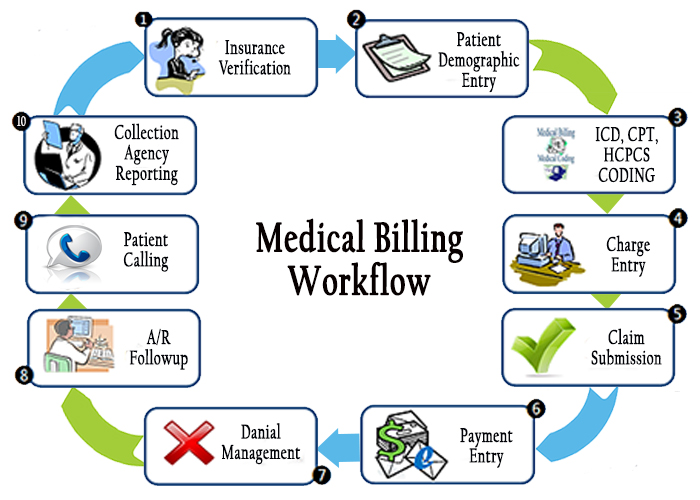Introduction & Process of Medical Billing
The medical billing starts from registering the patients by front desk staff, and obtaining their personal details (called demographics) and insurance coverage & benefits information. Based on a patient’s insurance plan, a medical biller can determine what services will be covered and which ones the patient will be responsible for, including non-covered charges, co-pays/co-insurances/deductibles. When the patient has checked out by a physician, the patient’ medical data and doctor’s notes being sent out to a medical coder who read out that and apply codes for the diagnostic and cure procedures performed (usually called CPT and ICD codes) used after for creating a superbill (technically called CMS/HCFA-1500 and UB-04). At next, a medical biller creates a claim including the cost of each procedure(CPT) code. The medical biller must be a professional to ensure that the claim is good to go or “clean” in compliance with state and federal regulations for coding and format. Some healthcare practices decide to even use a third party, known as a clearinghouse, to format claims according to the specifications of each insurance company and in accordance with HIPAA. This is necessary to see that one must be educated on the technical formalities and updates of this process or it could easily result in a denied or rejected claim otherwise, which means no or late and less reimbursement. The hurdles and complications in medical billing can be more for large scale practices providing a range of medical services under a healthcare setup. Solo and small practices can have managed their billing operations easily at their own (by keeping billing in-house) as compared to large ones but in absence of professionalism in billing they might be suffering and losing a part of their valuable revenue. So the popular and ultimate solution of all that is outsourcing the billing services to a full time professional (certified) company expert in handling your billing needs. It may have some disadvantages like data control issues but the solutions are always available and the advantages of outsourcing the billing services are much more. A physician or a practice could have different preferences while taking decision of have billing services in-house or take as outsourced but outsourcing will be the best option if a physician/practice wants to achieve max revenue from min cost.

